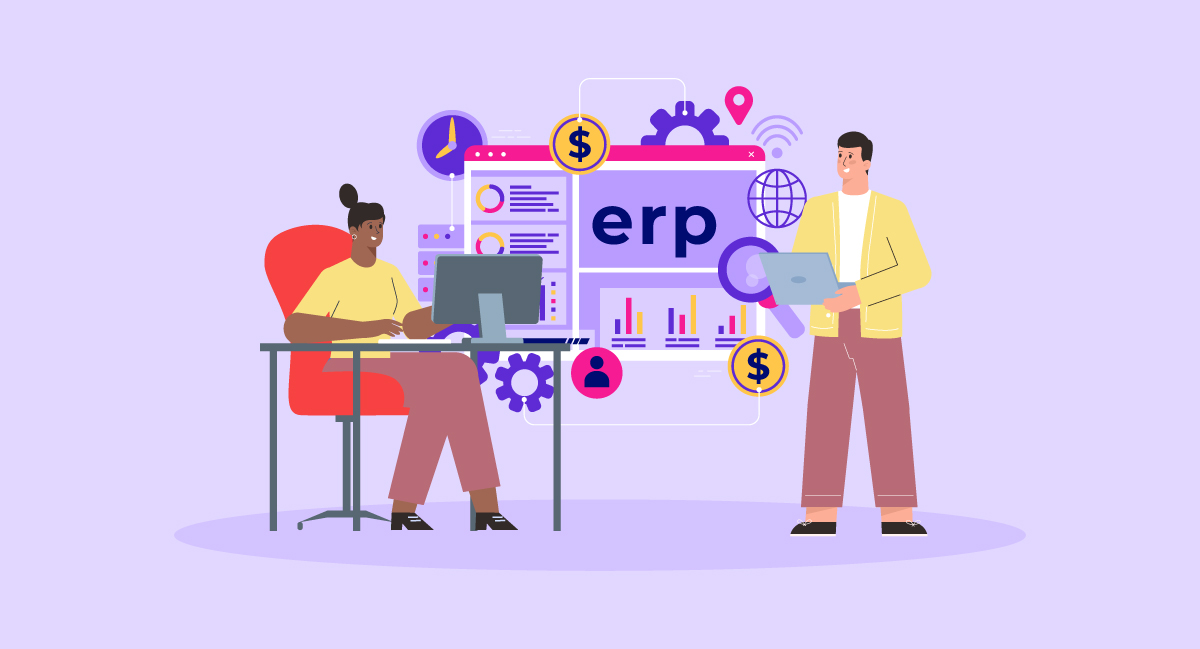An enterprise is like a team of people working together to achieve goals. It’s different from the usual way of doing things. Instead of separate pieces, it’s like one big piece of software that brings everything together.
This software, called Enterprise Resource Planning (ERP), has many smaller parts that handle different things like money, making products, dealing with customers, and managing projects. The enterprise resource planning (ERP) software market will grow to 101 billion U.S. dollars by 2026 on a global scale.
ERP components help organizations manage all these areas and adapt to changes. This makes things run better and more efficiently, so the organization can get more done and be more successful. It’s like having a smooth and organized way of doing things in all the company’s business processes.
Processes are streamlined, data management is improved, employee management and teamwork is improved thanks to the core enterprise resource planning software components.
Components of the ERP Systems
Within an organization, ERP system components or modules are like unique tools designed to handle specific business functions. Think of them as the puzzle pieces that come together to form a complete picture of the organization’s data and processes.
Pro-tip
The core and extended ERP components are crucial for efficiently managing and integrating business processes. The core module of ERP serves as the foundation for essential functions like finance, human resources, and inventory management. It ensures accurate data processing and coordination among departments.
Instead of using separate software for different departments, an ERP system brings these components together into a single platform. This more centralized system ensures that everyone involved can access and analyze the same information, promoting collaboration and consistency.
Accounting and financial management, human resources (HR), customer relationship management (CRM), purchasing, and supply chain management (SCM) are all components of enterprise resource planning. Each component is in charge of gathering information from the relevant business department and assisting with its processes.
For instance, the accounting software and financial management component manages accounts receivable and general ledger accounts, processes financial transactions, and payroll software keeps track of costs and income, and produces financial reports.

The HR and financial management module similarly oversees employee data, payment, benefits, performance reviews, and training, enabling effective personnel management and tactical workforce planning.
The ERP system combines and centralizes data from various disparate elements, resulting in a cohesive database. This data integration improves end-to-end business coordination, increases organizational efficiency, and promotes informed decision-making.
Organizations may eliminate data silos and guarantee that information flows effortlessly across departments with a centralized hybrid ERP system, boosting collaboration and synergy across the entire business. Stakeholders can acquire important insights, spot patterns, and make data-driven decisions that drive growth and optimize operations by having a comprehensive perspective of the organization’s data and processes.
What Are the Core ERP Components?
Enterprise Resource Planning (ERP) systems are powerful software tools that bring together different parts of a business into one place. Even ERP add-ons help make things run smoothly, increase productivity, and make it easier to make smart decisions using data.

ERP consists of several core components that form the foundation of the system. Let’s take a closer look at the core components of ERP that are listed below.
1. Accounting and Financial Management
ERP systems offer firms the necessary resources for effectively overseeing their financial operations. Within these systems, modules like general ledger, accounts payable, accounts receivable, fixed assets, and financial reporting empower organizations to track and regulate their monetary transactions.
By leveraging these modules, businesses can generate precise financial statements, monitor cash flows, and fulfill regulatory obligations. Consequently, they enhance financial transparency, streamline financial procedures, and optimize cash management.
2. Production/Materials Management
The ERP systems’ production/materials management part is concerned with streamlining an organization’s manufacturing and supply chain processes. It includes components like shop floor control, inventory management, and procurement.
Elements of enterprise resource planning let businesses keep track of and manage their inventory levels, schedule production, simplify the procurement business process, and track the movement of commodities along the supply chain. an ERP solution enables firms to increase production efficiency, lower inventory costs, and risk management shorten lead times, and even boost profitability and customer satisfaction by integrating various processes into a single system.
3. Human Resources
ERP systems’ human resources (HR) component offers firms a consolidated platform for managing HR operations and employee-related data. Employee information management, payroll, benefits administration, time and attendance, and talent management are among the modules included.
ERP enables businesses to automate HR processes, track employee data, manage workforce scheduling, and facilitate performance evaluations.
With ERP’s HR capabilities, organizations can improve HR efficiency, enhance employee engagement, and make data-driven decisions regarding workforce planning and talent development.
Core ERP components collaborate to assist organizations in efficiently handling crucial business operations. Their integration into a unified system streamlines real-time data sharing and collaboration, eliminating the need for multiple systems and manual data entry. This integration enhances accuracy by reducing errors.
Moreover, when these core parts are integrated, organizations can use data analytics and reporting to gain valuable insights. ERP systems have strong reporting and predictive analytics features, so businesses can keep an eye on important measures, spot patterns, and make smart choices
For instance, financial data can be analyzed to assess profitability, production efficiency can be evaluated, and employee performance metrics can be tracked. The synergy between these components enables organizations to streamline operations, improve efficiency, and make data-driven decisions, ultimately contributing to their overall success.
What Are the Extended ERP Components?
Extended ERP components refer to additional modules or functionalities that are integrated with the core Enterprise Resource Planning (ERP) system to enhance its capabilities and address specific business needs. These components primarily include:
1. Business Intelligence
Business intelligence (BI) is the umbrella term for the systems and procedures used to collect, examine, and meaningfully present data to support decision-making. Organizations can gain useful insights from their data, such as sales data, financial data, and operational metrics, with the help of BI modules in extended ERP systems.
Users can easily monitor key performance indicators, spot trends, get actionable insights and make informed business decisions by using reports, dashboards, and data visualizations to display these insights.
By utilizing data-driven insights, BI assists organizations in using actionable insights regarding business risks, identifying areas for improvement, streamlining workflows, and gaining a competitive edge.
2. Customer Relationship Management
CRM modules in extended ERP systems are concerned with managing customer interactions and relationships. Unlocking the potential of CRM software, businesses effortlessly gather and organize valuable customer data.
This information empowers businesses to craft personalized marketing endeavors, revolutionize customer service, and ultimately enhance overall customer satisfaction.
CRM helps organizations build stronger customer relationships, increase sales, and improve customer retention by centralizing customer data and streamlining customer-facing processes.
3. Supply Chain Management (SCM)
Supply Chain Management (SCM) modules within extended ERP systems help organizations manage the flow of goods, services, and information across their supply chains.
SCM modules track orders and shipments, optimize transportation routes and streamline supplier relationships. They also give real-time visibility into inventory levels.
SCM assists businesses in lowering costs, shortening lead times, enhancing product quality, and raising customer satisfaction by ensuring efficient supply chain operations. SCM also allows stakeholders to collaborate and share information more effectively, making the supply chain more responsive and agile.
4. Inventory Management System
Inventory management modules in extended ERP systems assist organizations in effectively managing inventory levels. With inventory management systems, organizations can reduce inventory holding costs by accurately forecasting demand, avoiding stock outs, and minimizing excess inventory.
These modules also support barcode scanning, serial number tracking, and batch management, which ensures accurate inventory tracking and error reduction.
5. Data Management And Integration
Extended ERP systems rely heavily on data management and integration. These modules enable organizations to achieve a unified view of their data by facilitating the seamless exchange of data between various applications and systems.
Data management and integration modules help with data cleansing, transformation, and synchronization across databases and systems. They also allow data integration with third-party systems, such as supplier systems or e-commerce platforms.
These modules improve decision-making, enable efficient business processes, and support data-driven initiatives by ensuring data accuracy, consistency, and accessibility. Modules for data management and integration assist organizations in breaking down data silos, improving data quality, and achieving a single source of truth for their data.
6. E-business (including E-logistics and E-procurement)
Organizations can conduct business electronically by utilizing the power of the internet and digital technologies thanks to e-business modules within extended ERP systems. E-logistics modules concentrate on streamlining transportation and logistics processes.
They enable route optimization, warehouse management, and real-time shipment tracking, which improves supply chain effectiveness and lowers transportation costs. On the other hand, e-procurement modules streamline and automate the purchasing process, allowing businesses to manage vendor relationships, request and compare quotes, and create purchase orders automatically.
Online transactions, electronic payments, and e-commerce integrations are supported by e-business modules, enabling businesses to reach a wider audience, increase customer convenience, and spur business expansion online.
Conclusion
Harnessing the power of integration, organizations can enjoy seamless information flow, bidding farewell to data silos. Collaboration and decision-making are amplified thanks to this harmonious integration. Moreover, customization empowers organizations to automate business processes and tailor the system to their unique needs, amplifying flexibility and adaptability to new heights.
The fusion of these remarkable components of ERP systems empowers organizations to unlock operational optimization, skyrocketing efficiency, manual inventory control, and financial management enabling well-informed decision-making. In today’s fast-paced business landscape, ERP systems have evolved into indispensable tools for businesses striving to streamline processes and amplify overall performance.
Connect with our seasoned experts today to delve deeper into the transformative potential of ERP systems.
Frequently Asked Questions

Supriya is a highly skilled content writer with over 8 years of experience in the SaaS domain. She believes in curating engaging, informative, and SEO-friendly content to simplify highly technical concepts. With an expansive portfolio of long-format blogs, newsletters, whitepapers, and case studies, Supriya is dedicated to staying in touch with emerging SaaS trends to produce relevant and reliable content.
[adsanity_group align=’alignnone’ num_ads=1 num_columns=1 group_ids=’15192′]
Need Any Technology Assistance? Call Pursho @ 0731-6725516




